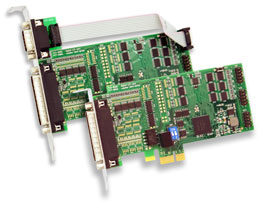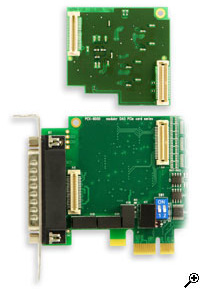DAQ PCI Express cards

With over 25 years of plug-in DAQ card design and manufacturing experience (ISA, PC/104, PCI, PCI Express), TEDIA provides a wide range of industrial data acquisition and control products.
The PCI Express bus, the successor to the conventional PCI bus, is a modern bus providing high data bandwidth (even in the basic x1 Gen1 version it can achieve throughput above 100MB/s in both directions simultaneously) and offers scalability according to device requirements (e.g. PCI Express in versions x1 to x16, or Gen2 and Gen3 variants). However, the fundamental advantage over previous buses is the dedicated data channel for each device; while for previous busses the bandwidth was shared by all devices on the bus, in case of PCI Express each device uses its own data channel and data transfers of different devices are not affected (on bus-level) by each other.
However, PCI Express bus (against PCI bus) does not accelerate data transfer in real-time applications, when the program reads several input values from the card, and writes the control intervention to the outputs. PCI Express achieves high bandwidth throughput only with continuous block data transfer, while with one-time access to registers works a bit slower than a conventional PCI bus. In other words, the high PCI Express data bandwidth will not be used in real-time control application, when whole algorithm runs on a PC.
General properties
- the cards are based on a FPGA unified core providing implementation of PCI Express bus and all peripheral circuitry, e.g. solution that gives maximum control and supervision over full functionality
- high concentration of control algorithms within FPGA (outside the FPGA are only I/O line drivers or A/D or D/A converters) allows to add or modify functions without redesign the board
- optical isolation of all inputs and outputs lines as standard (except of bidirectional DIO ports with TTL/HC signal level)
- not only standard height card design (in this case, the number and type of connectors is identical with DAQ PCI cards including a wide range of internal signal conditioning boards), but all types are in low-profile design also available
- user-friendly firmware upgrade; in addition, the cards are equipped with a backup configuration flash memory in case of write failure into the primary memory
- CardID - two segment DIP switch that allows to recognise up to 4 cards (especially when installing multiple cards of the same type)
- possibility to extend firmware with special custom features or a completely new custom firmware on existing hardware
- possibility of custom-made development of a new card, or just only a new piggy-back module
- really simple and native registers structure, programmer's guide with complete registers description and open system level windows drivers, that is user-frindly way to create custom application drivers; universal driver TEDIA_DAQ01 with an abstract API is also available
Multifunction cards (analog inputs & additional I/O ports)
| Type | Description |
|---|---|
| PCA-8428 | multifunction card - 8 S.E. analog inputs (isolated) - 2 analog outputs (isolated) - 24 DIO (bidirectional I/O lines organized into three 8-bit ports) - analog inputs/outputs solved by a piggy-back module |
| PCA-8429 | multifunction card - 8 S.E. analog inputs (isolated) - 24 DIO (bidirectional I/O lines organized into three 8-bit ports) - analog inputs solved by a piggy-back module |
| PCA-8438 | multifunction card - 16 S.E. analog inputs (isolated) - 2 analog outputs (isolated) - 24 DIO (bidirectional I/O lines organized into three 8-bit ports) - analog inputs/outputs solved by a piggy-back module |
| PCA-8439 | multifunction card - 16 S.E. analog inputs (isolated) - 24 DIO (bidirectional I/O lines organized into three 8-bit ports) - analog inputs solved by a piggy-back module |
Analog outputs cards (analog outputs & additional I/O ports)
| Type | Description |
|---|---|
| PCA-8288 | analog outputs card - 8 analog outputs with 12-bit A/D converters (isolated) - 24 DIO (bidirectional I/O lines organized into three 8-bit ports) - analog outputs solved by a piggy-back module |
| PCA-8688 | analog outputs card - 8 analog outputs with 16-bit A/D converters (isolated) - 24 DIO (bidirectional I/O lines organized into three 8-bit ports) - analog outputs solved by a piggy-back module |
Digital inputs/outputs cards
| Type | Description |
|---|---|
| PCD-8006 | digital I/O card - 48 DIO (bidirectional I/O lines organized into six 8-bit ports) |
| PCD-8104 | digital I/O card (isolated inputs) - 24 isolated digital inputs (TTL/HC signal level) - 24 DIO (bidirectional I/O lines organized into three 8-bit ports) |
| PCD-8105 | digital I/O card (isolated inputs) - 24 isolated digital inputs (24V signal level) - 24 DIO (bidirectional I/O lines organized into three 8-bit ports) |
| PCD-8106 | digital I/O card (isolated inputs) - 24 isolated digital inputs (24V signal level) - 24 DIO (bidirectional I/O lines organized into three 8-bit ports) |
IRC encoders/counters & SSI controllers cards
| Type | Description |
|---|---|
| PCT-8303 | IRC encoders/counters card - three quadrature encoders & 32-bit counters (isolated) - 24 DIO (bidirectional I/O lines organized into three 8-bit ports) |
| PCT-8306 | IRC encoders/counters card - six quadrature encoders & 32-bit counters (isolated) - 24 DIO (bidirectional I/O lines organized into three 8-bit ports) |
| PCT-8360 | SSI controllers card - six SSI interfaces (isolated) - 24 DIO (bidirectional I/O lines organized into three 8-bit ports) |
| PCT-8363 | IRC encoders/counters & SSI controllers card - three quadrature encoders & 32-bit counters (isolated) - six SSI interfaces (isolated) - 24 DIO (bidirectional I/O lines organized into three 8-bit ports) |
Counters & timers cards
| Type | Description |
|---|---|
| PCT-8424 | counters & timers card - 24 isolated digital inputs (TTL/HC signal level) - 24 counters (32-bit, unidirectional) & 24 timers (32-bit) - 24 DIO (bidirectional I/O lines organized into three 8-bit ports) |
| PCT-8425 | counters & timers card - 24 isolated digital inputs (24V signal level) - 24 counters (32-bit, unidirectional) & 24 timers (32-bit) - 24 DIO (bidirectional I/O lines organized into three 8-bit ports) |
| PCT-8426 | counters & timers card - 24 isolated digital inputs (24V signal level) - 24 counters (32-bit, unidirectional) & 24 timers (32-bit) - 24 DIO (bidirectional I/O lines organized into three 8-bit ports) |
Software support
Drivers for the following operating systems are available for DAQ PCIe cards:
- Windows 11 and Windows 10 (all 32-bit & 64-bit version)
- Windows 8/8.1, Windows 7, Windows Server 2012 R2, Windows Server 2012 and Windows Server 2008 R2 (all 32-bit & 64-bit version), will no longer be updated
- Windows Server 2016 and Windows Server 2019 are not (and will not be) supported
- Windows Vista and older (resp. Windows Server 2008 and older) are supported by separate driver versions, but without TEDIA technical support
- programmer's guide with complete description of the registry structure and control procedures (samples of source code also available)
Appplication drivers & software utilities:
- program examples (C++, Visual Basic, Delphi)
- Control Web drivers
(a Czech development environment provided by Moravian Instruments) - Linux support; programmer's guide with complete description of the registry structure and control procedures (samples of source code also available)
Note: For more information on drivers and software, see the sections Software & drivers or Download.


